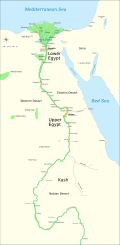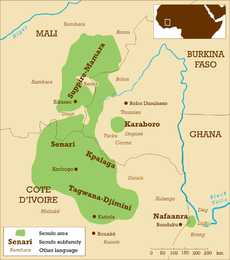Portal:Africa



Africa is the world's second-largest and second-most populous continent after Asia. At about 30.3 million km2 (11.7 million square miles) including adjacent islands, it covers 20% of Earth's land area and 6% of its total surface area. With nearly 1.4 billion people as of 2021, it accounts for about 18% of the world's human population. Africa's population is the youngest among all the continents; the median age in 2012 was 19.7, when the worldwide median age was 30.4. Based on 2024 projections, Africa's population will reach 3.8 billion people by 2099. Africa is the least wealthy inhabited continent per capita and second-least wealthy by total wealth, ahead of Oceania. Scholars have attributed this to different factors including geography, climate, corruption, colonialism, the Cold War, and neocolonialism. Despite this low concentration of wealth, recent economic expansion and a large and young population make Africa an important economic market in the broader global context. Africa has a large quantity of natural resources and food resources, including diamonds, sugar, salt, gold, iron, cobalt, uranium, copper, bauxite, silver, petroleum, natural gas, cocoa beans, and.
Africa straddles the equator and the prime meridian. It is the only continent to stretch from the northern temperate to the southern temperate zones. The majority of the continent and its countries are in the Northern Hemisphere, with a substantial portion and a number of countries in the Southern Hemisphere. Most of the continent lies in the tropics, except for a large part of Western Sahara, Algeria, Libya and Egypt, the northern tip of Mauritania, and the entire territories of Morocco and Tunisia, which in turn are located above the tropic of Cancer, in the northern temperate zone. In the other extreme of the continent, southern Namibia, southern Botswana, great parts of South Africa, the entire territories of Lesotho and Eswatini and the southern tips of Mozambique and Madagascar are located below the tropic of Capricorn, in the southern temperate zone.
Africa is highly biodiverse; it is the continent with the largest number of megafauna species, as it was least affected by the extinction of the Pleistocene megafauna. However, Africa also is heavily affected by a wide range of environmental issues, including desertification, deforestation, water scarcity, and pollution. These entrenched environmental concerns are expected to worsen as climate change impacts Africa. The UN Intergovernmental Panel on Climate Change has identified Africa as the continent most vulnerable to climate change.
The history of Africa is long, complex, and varied, and has often been under-appreciated by the global historical community. In African societies the oral word is revered, and they have generally recorded their history via oral tradition, which has led anthropologists to term them oral civilisations, contrasted with literate civilisations which pride the written word. During the colonial period, oral sources were deprecated by European historians, which gave them the impression Africa had no recorded history. African historiography became organized at the academic level in the mid-20th century, and saw a movement towards utilising oral sources in a multidisciplinary approach, culminating in the General History of Africa, edited by specialists from across the continent. (Full article...)
Selected article –
The Rozvi Empire (1480–1866) was a Shona state established on the Zimbabwean Plateau by Changamire Dombo. The term "Rozvi" refers to their legacy as a warrior nation, taken from the Shona term kurozva, "to plunder". They became the most powerful fighting force in the whole of Zimbabwe. (Full article...)
Featured pictures –
Did you know (auto-generated) -

- ... that the book Love Falls On Us, about the LGBTQ movement in Africa, was praised by author Uzodinma Iweala for "elevating the extraordinary ordinariness of L.G.B.T.Q. Africans"?
- ... that desert kites in the Middle East and North Africa were used as traps for wild game?
- ... that Pocatello mayor Les Purce was the first African-American political officeholder in Idaho?
- ... that Lea Ackermann, a German nun of the Missionary Sisters of Our Lady of Africa, fought against forced prostitution and sex tourism in East Africa?
- ... that Kenyan coffee farmer "Pinkie" Jackson amassed Africa's largest collection of native butterflies?
- ... that South African mayor Marlene van Staden was re-elected through a coin toss?
Categories
Selected biography –
Grace Naledi Mandisa Pandor (née Matthews; born 7 December 1953) is a South African politician, educator and academic who served as the Minister of International Relations and Cooperation until 2024. She also served as a Member of Parliament (MP) for the African National Congress (ANC) from 1994 to 2024.
Born in Durban, Pandor completed high school in Botswana. She qualified as a teacher and taught at multiple schools and universities, while she achieved various degrees from different universities. Pandor took office as a Member of Parliament in 1994. She soon became Deputy Chief Whip of the ANC caucus in 1995. She was elected Deputy Chairperson of the National Council of Provinces in 1998 and became chairperson in 1999. (Full article...)
Selected country –
 |
 |
|

| ||
Madagascar, officially the Republic of Madagascar (older name Malagasy Republic), is an island nation in the Indian Ocean, off the southeastern coast of Africa. The main island, also called Madagascar, is the fourth largest island in the world, and is home to five percent of the world's plant and animal species, more than 80 percent of which are endemic to Madagascar. Agriculture, including fishing and forestry, is a mainstay of the economy. Major exports are coffee, vanilla, sugarcane, cloves, cocoa, rice, cassava (tapioca), beans, bananas, peanuts and livestock products.
The principal institutions of the Republic of Madagascar are a presidency, a parliament (National Assembly and Senate), a prime ministry and cabinet, and an independent judiciary. The president is elected by direct universal suffrage for a 5-year term, renewable twice. The National Assembly consists of 160 representatives elected by direct vote every 5 years. The Senate consists of 90 senators, two-thirds elected by local legislators and other Grand Electors and one-third appointed by the president, all for 6-year terms. (Read more...)
Selected city –
Kampala (UK: /kæmˈpɑːlə/, US: /kɑːmˈ-/ ⓘ) is the capital and largest city of Uganda. The city proper has a population of 1,875,834 (2024) and is divided into the five political divisions of Kampala, Kawempe, Makindye, Nakawa, and Rubaga.
Kampala's metropolitan area consists of the city proper and the neighboring Wakiso District, Mukono District, Mpigi District, Buikwe District and Luweero District. It has a rapidly growing population that is estimated at 6,709,900 people in 2019 by the Uganda Bureau of Statistics in an area of 8,451.9 km2 (3,263.3 square miles). Other estimates estimate put the size of the metropolitan area at around four million people. (Full article...)
In the news
- 22 January 2025 – Constitutional crisis in Somalia, Transport in Somalia
- The Somali Airlines Operators Association, representing at least 20 airlines, suspends all flights beginning on January 22, 2025, in protest against increased government-imposed fees after disputes with the Ministry of Aviation and the Somali Civil Aviation Authority. (Shabelle Media) (Hiiraan Online)
- 21 January 2025 – Kivu conflict
- M23 rebels seize the town of Minova in Kalehe Territory, Democratic Republic of the Congo, cutting off a major supply route to the strategic city of Goma. (Reuters)
- 21 January 2025 –
- Four people are injured, one seriously, in a stabbing attack in Tel Aviv, Israel. The Shin Bet confirm that the attacker was a 28-year-old from Morocco, and had permanent residency in the United States. (BBC) (The Times of Israel) (Xinhua)
- Twenty Ethiopian migrants are killed when their boat capsizes off Yemen after departing from Djibouti, according to the International Organization for Migration. (Al Arabiya)
- 18 January 2025 –
- Ghanian soldiers open fire on illegal miners at a gold mine in Ashanti Region, killing seven people. Ghanian president John Mahama calls for an investigation into the incident. (AP)
- 18 January 2025 – 2025 Suleja fuel tanker explosion
- At least 86 people are killed and several others are injured when a fuel tanker overturns on a highway in Suleja, Niger State, Nigeria, and later explodes when people gather to collect the spilled fuel. (Vanguard) (The Straits Times)
Updated: 9:05, 23 January 2025
General images -
Africa topics
More did you know –
- ...that Iyabo Obasanjo-Bello, a Nigerian Senator from the People's Democratic Party, is the daughter of former President Olusegun Obasanjo?
- ...that the 2007 South Africa miners' strike, which impacted over 240,000 workers, was the first ever industry-wide miners' strike in the history of South Africa?
- ...that Seleh Leha, a town in Tigray Region in northern Ethiopia, was the site of a leprosarium built during the Italian occupation of East Africa and abandoned in 1941?
- ...that Sarir field, an oil field in Cyrenaica operated by the Arabian Gulf Oil Company (AGOCO), is considered to be the largest in Libya, with estimated oil reserves of 12 Gbbl (1.9×109 m3)?
Related portals
Major Religions in Africa
North Africa
West Africa
Central Africa
East Africa
Southern Africa
Associated Wikimedia
The following Wikimedia Foundation sister projects provide more on this subject:
-
Commons
Free media repository -
Wikibooks
Free textbooks and manuals -
Wikidata
Free knowledge base -
Wikinews
Free-content news -
Wikiquote
Collection of quotations -
Wikisource
Free-content library -
Wikispecies
Directory of species -
Wikiversity
Free learning tools -
Wikivoyage
Free travel guide -
Wiktionary
Dictionary and thesaurus

























































































